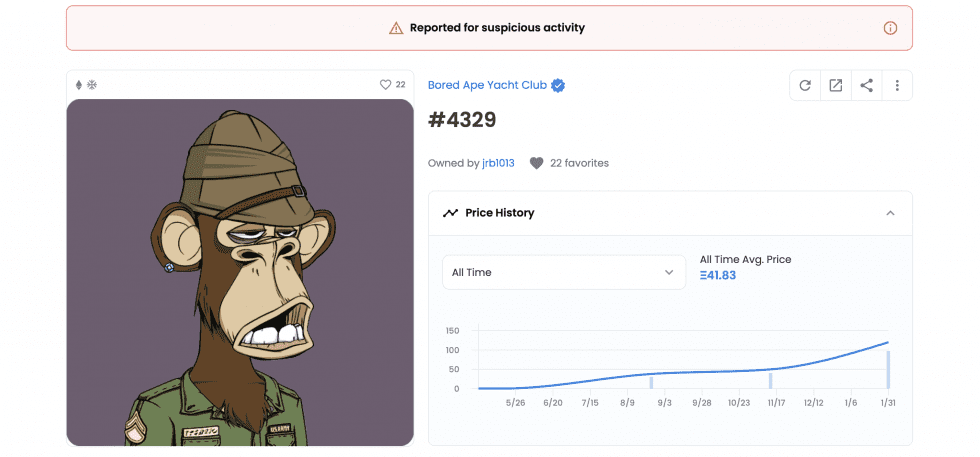OpenSea wants a former Bored Ape Yacht Club (“BAYC”) non-fungible token (“NFT”) holder’s negligence lawsuit against it tossed out, arguing that it is merely a marketplace and does not have a duty to protect users from “dangerous conduct,” including enduring scams aimed at stealing heavily-hyped NFTs. In a newly-filed motion to dismiss, Ozone Networks d/b/a/ OpenSea argues that not only does plaintiff Robert Armijo fail to present “any novel legal questions” in the complaint that he filed against it, LooksRare, and BAYC creator Yuga Labs in February, his negligence claim against OpenSea – namely, that it failed to implement “common sense and reasonable security measures” to protect users from fraud and from the sale of stolen NFTs – is a “nonstarter.”
Setting the stage in its June 3 motion to dismiss, OpenSea states that it is a “web3 peer-to-peer marketplace where users can explore NFTs and can connect directly with each other to purchase and sell NFTs.” Armijo alleges, according to OpenSea, that “although he purchased three NFTs using OpenSea’s platform, these NFTs were subsequently stolen through a phishing scam by a third party on Discord, [which is] a completely different online platform.” Nonetheless, OpenSea claims that Armijo is looking to hold it “liable for the loss of his stolen NFTs enabled by his use of the unaffiliated Discord platform because, he alleges, OpenSea owed and breached a duty to prevent the third party from subsequently relisting those NFTs for sale on its platform.”
While “NFTs are relatively novel,” OpenSea argues that “the legal issues presented in this case are not.” Specifically, the New York-based NFT platform contends that “it has long been the rule in Nevada” – where Armijo filed his lawsuit – “that ‘no duty is owed to control the dangerous conduct of another or to warn others of the dangerous conduct, except where a special relationship exists and the harm is created by foreseeable conduct.’” And at the same time, OpenSea alleges that Nevada courts “have never recognized a special relationship akin to that between a website and its users.”

“As an NFT marketplace, OpenSea had zero control over [Armijo’s] NFTs themselves, and its limited control over NFT listings posted using its own platform does not establish a special relationship as a matter of law.” Doubling-down on its lack of control claim, OpenSea states that the subsequent sale of Armijo’s NFTs on LooksRare, a different NFT platform that is also named as a defendant in the lawsuit, “demonstrates the sharply circumscribed limits of OpenSea’s purported ‘control’ over anything: OpenSea cannot limit transactions using other platforms because it does not have any control over those platforms or the decentralized blockchain technology underlying NFTs.”
Still yet, OpenSea contends that “although (like any other website) [it] can monitor or prohibit listings on its own platform, not only would that not have prevented the resale of [Armijo’s] NFTs elsewhere (in other words, resales on LooksRare or another platform would still go forward), but the law is well-settled that such routine website operations are insufficient as a matter of law to establish the existence of a special relationship.”
Against this background, OpenSea argues that “there was no duty owed to [Armijo],” and thus, “his claim for negligence against [it] is a nonstarter.”
Even if such a “special relationship” did exist, OpenSea claims that Armijo does not plausibly allege that it breached any purported duties to him or that its actions caused him any harm. For instance, OpenSea asserts that while Armijo argued that he was harmed by OpenSea’s “failure to implement proactive theft detection methods … to determine whether the NFTs uploaded to its platform have been stolen,” he did not actually suffer “any harm caused by OpenSea in connection with the subsequent resale of his stolen NFTs on the OpenSea platform.” (Emphasis courtesy of OpenSea.) This is because, “as the complaint alleges, the theft of the NFTs became ‘permanent and irreversible’ the instant the phishing scam [he] fell prey to on the Discord platform was complete.” (All validated NFT transactions are immutable because they are recorded permanently on the blockchain.)
OpenSea also argues on this point that “due to the decentralized nature of blockchain technology, freezing the purchase or sale of the NFTs” by way of the OpenSea platform does “not prevent stolen NFTs from being purchased or traded on any other NFT marketplaces.” That is what occurred here, the defendant asserts, noting that after it froze the NFTs at issue to prevent them from being traded on its own platform, two of the NFTs were later listed and resold on LooksRare. OpenSea states that Armijo’s own allegations explain that it is “powerless to ‘undo a transaction once it has been completed on the blockchain’ or ‘prevent the stolen NFTs from being purchased or traded on any other NFT marketplaces’ other than OpenSea – which is exactly what happened with two of the stolen NFTs.”
Armijo’s claims for negligent hiring, training, and supervision are “substantively duplicative of his negligence claim,” per OpenSea, and “similarly flawed.” As with his negligence claim, Armijo “does not allege that OpenSea’s employees caused him harm – only that their steps to remediate harm caused by an unaffiliated third party who had stolen his NFTs through a phishing scam on another platform were inadequate.”
Finally, OpenSea argues that all of Armijo’s claims are separately barred both by contract and by the economic loss doctrine, as he agreed to OpenSea’s Terms of Service, which “clearly and unambiguously disclaim liability for negligence claims focused on harms caused by third parties, including injuries related to ‘phishing.’” Beyond that, Armijo’s claims are barred by Nevada’s economic loss doctrine, OpenSea asserts, as “they seek damages that are solely monetary in nature,” and “under the economic loss doctrine . . . economic losses are not recoverable in negligence absent personal injury or damage to property other than the defective entity itself, neither of which [Armijo] alleges here.”
With the foregoing in mind, OpenSea claims that Armijo’s complaint against it should be dismissed without leave to amend.
The motion to dismiss filed by OpenSea comes roughly three months after Armijo waged a negligence lawsuit against it, LooksRare, and Yuga, claiming that the three defendants “have taken advantage of the unregulated digital asset market and have profited enormously from the sale of stolen NFTs, including the NFTs that were stolen from [him].” In the complaint that he filed in a federal court in Nevada, Armijo alleges that three of his NFTs were stolen in a phishing attack in February and that despite his attempts to get the defendants to block subsequent sale of the stolen NFTs, they “failed to provide adequate and reasonable customer service” to aid him or protect unsuspecting buyers.
The three NFTs at the heart of the lawsuit are BAYC Bored Ape #4329 NFT, which Armijo acquired in November for the equivalent of $221,337, and two NFTs from Yuga’s collection of Mutant Ape Yacht Club: MAYC #1819 and MAYC #7713, which he purchased for a total of $82,356.30.
The case is Robert Armijo v. Ozone Networks, et al, 3:22-cv-00112 (D.Nev.).











